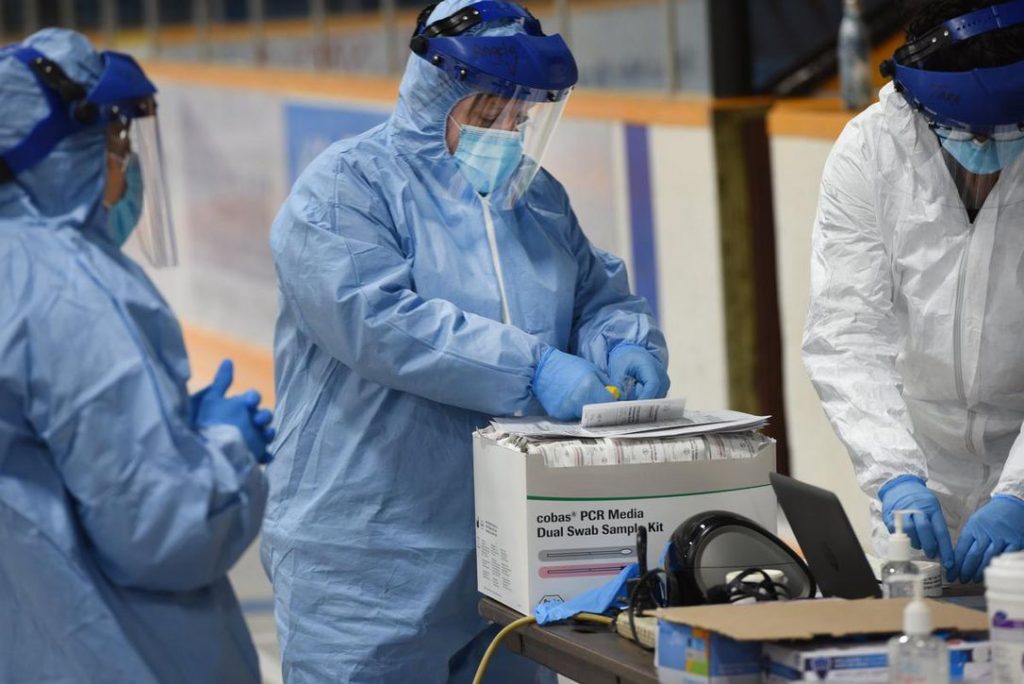The order was issued to provide much-needed assistance to the home, which had been battling an extremely complex and challenging outbreak of COVID-19 under the guidance of Region of Waterloo Public Health and with the support of local hospitals. The outbreak was declared over on June 30.
“The teams from Forest Heights, St. Mary’s and St. Joseph’s Health System worked quickly and collaboratively to execute the action plan we submitted to the Ministry of Long-Term Care,” said Lee Fairclough, president of St. Mary’s General Hospital. “We were pleased to support the Forest Heights team in stabilizing the home, re-starting services and bringing home the residents who had been moved to local hospitals during the outbreak.”
They express thanks to cross sector partners for embracing this effort throughout, including Waterloo Region Public Health, local hospitals who supported residents (Grand River Hospital and Cambridge Memorial Hospital), community partners, and co-leads for Waterloo Region’s Pandemic Response Tri-ad, Dr. Hsiu-Li Wang and Dr. Sharon Bal, and colleagues at Ontario Health West.
The action plan’s goals were to end the outbreak, safeguard the health and safety of residents and staff at Forest Heights, support the care of Forest Height’s residents and stabilize the home. All items on the action plan have been completed.
Revera extends its sincere appreciation to the teams from St. Mary’s and St. Joseph’s, who provided much-needed support for Forest Heights staff and managers who were exhausted after working tirelessly under extremely stressful circumstances to battle the devastating virus.
“This pandemic has underscored the importance of partnership,” said Wendy Gilmour, senior vice president of Long Term Care at Revera. “The many different players in the health care system can’t stand alone – we all must work together to improve experiences for people through integrated care. We are grateful that we now have a very close relationship with St. Mary’s, and look forward to an enduring collaboration with their expert teams.”
In addition, the management and staff of Forest Heights wish to express their gratitude for the outpouring of support from the community and from the families and friends of residents. Their words and gestures of support provided much-needed encouragement during a very difficult time.
About the outbreak
- Outbreak declared: April 1, 2020
- Outbreak declared over: June 30, 2020
- Capacity of home prior to pandemic: 240
- Number of residents decanted to local hospitals during the outbreak: 43
- Capacity of home following re-design and reduced number of beds per room: 168
- Current occupancy of home: 152
Contingencies in place for a potential second wave
- A stockpile of personal protective equipment (PPE)
- A three-bed isolation area
- A new infection prevention and control (IPAC) specialist on staff and enhanced IPAC practices
- A liaison with the community hospitals
- An enduring relationship with St. Mary’s, including ongoing touch points on IPAC, building services, procurement
- Above-complement staffing
Media Inquiry Contact:
Anne Kelly
Manager, Communications
St. Mary’s General Hospital
519-749-6578, ext. 1501
226-339-1903 (cell)
Larry Roberts
Director, Communications
Revera
289-997-5721 (office)
647-330-5383 (cell)
Larry.Roberts@reveraliving.com
By Katrina Clarke Spectator Reporter
Mon., April 20, 2020
A new pilot project will see some 3,000 asymptomatic residents and staff at Hamilton and area care settings tested for COVID-19.
On Monday, St. Joseph’s Health System and Niagara Health announced a pilot project is underway to test all asymptomatic patients, residents and some staff in its long-term care homes, retirement homes and congregate settings, such as hospices.
The goal is to gain a better understanding of how the virus spreads, how can spread be prevented and what testing strategies are most effective when the subjects are concentrated in one place, said Dr. Jack Gauldie, vice-president of research at St. Joseph’s Healthcare Hamilton.
“Right now, we stand outside long-term care homes and we don’t know how many people are carriers in there, how many people are affected,” Gauldie said. “The earlier you catch something, the earlier you can do something about it.”
The announcement comes a week after the province said more people in long-term care settings would be tested for the virus. Testing of all asymptomatic staff and residents at “select homes” would take place, said Minister of Long-Term Care Merrilee Fullerton.
Dr. Tom Stewart, CEO of St. Joseph’s Health System, said those involved with the pilot project wanted to be ahead of the curve.
“Let’s get an understanding of are there patients in there that are asymptomatic that could be the cause of a future outbreak?” Stewart said. “Let’s collect more information.”
Testing is already underway.
According to a release, 111 long-term care residents have so far been tested for COVID-19 “whether they had symptoms or not” as part of the pilot. All tests were negative. Staff have the option of being tested.
All 3,000 tests are expected to be carried out this week, Stewart said.
Facilities included in the pilot project include St. Joseph’s Villa in Dundas, St. Joseph’s Health Centre in Guelph, St. Joseph’s Lifecare Centre Brantford and Stedman Community Hospice in Brantford, St. Joseph’s Home Care First Place retirement living in Hamilton and the Niagara Health long-term care unit in Welland.
Hamilton public health, meanwhile, has carried out “mass testing” of staff and residents at seniors’ care homes, said Dr. Bart Harvey, Hamilton’s associate medical officer of health, on Monday.
Mass testing sites include Cardinal Retirement Residence, Chartwell Deerview Crossing Retirement Residence and Kingsberry Retirement Residence. Outbreaks are ongoing at each location.
So far, 45 residents and 17 staff at Cardinal have tested positive. Six died. One staff member at Chartwell Deerview tested positive and three Kingsberry residents have tested positive.
Harvey said mass testing gives public health “a much better idea of what efforts are needed and what strategies are needed to curb any further transmission.”
Long-term care homes across the country have been the epicentre of deadly COVID-19 outbreaks for more than a month. Half of Canada’s COVID-19 deaths stem from long-term care homes, said Dr. Theresa Tam, the country’s chief public health officer, last week.
As of Monday, 16 people in Hamilton have died from COVID. All but four were residents of one of two long-term care homes — Heritage Green and Cardinal — or Emmanuel House Hospice.
The pilot project is a joint effort and includes researchers at the Research Institute of St. Joe’s Hamilton, McMaster University, Hamilton Regional Laboratory Medicine Program, Guelph Family Health Team and GTA public health units.
Gauldie said once the project is complete, experts will analyze data, looking at how to minimize glitches, maximize efficiency and improve accuracy.
“We need to see how to do it correctly,” he said.
Katrina Clarke is a Hamilton-based reporter at The Spectator. Reach her via email: katrinaclarke@thespec.com
St. Joseph’s Health System & Niagara Health launch new pilot surveillance project to protect the most vulnerable in our health system
April 20, 2020 – COVID-19 has had a devasting effect within many congregate care facilities caring for vulnerable elderly residents, prompting the Ontario government to call for greater testing in long-term care and retirement homes.
With that in mind, St. Joseph’s Health System (SJHS) and Niagara Health are taking the vital step in testing all asymptomatic patients, residents and select staff within its long-term care, retirement home and congregate settings as part of a pilot surveillance project.
Under the directive of Dr. Tom Stewart, CEO of St. Joseph’s Health System and Niagara Health, and the SJHS Executive team, supported by Research Institute and Lab, the project will test our most vulnerable patients and residents, including those living in long-term care, to save lives.
Researchers at the Research Institute of St. Joe’s Hamilton, McMaster University, Guelph Assessment Centre, Public Health Ontario Lab and select public health units across the GTA are working together to test thousands of samples collected from long-term care facilities and retirement homes.
“We are testing the prevalence of asymptomatic COVID positive cases that could inform future testing strategies and prevention measures to curb the spread of this devastating virus and save lives,” Says Dr. Jack Gauldie, Vice-President of Research at St. Joseph’s Healthcare Hamilton. “It’s vital we learn how we can protect our most vulnerable population and our staff today and, in the future. We need to share our findings widely to make changes to how we protect the elderly living in congregate settings.”
“St. Joseph’s Health System and Niagara Health are committed to delivering integrated care across the continuum,” says Dr. Tom Stewart. “With our capacity and network of hospitals, research laboratories, long-term care home, Home Care, and retirement homes, it would be irresponsible not to put our collective efforts together in the fight against COVID-19. If our surveillance project demonstrates that asymptomatic cases can be COVID positive, it will dramatically change the COVID-19 response and prevention strategy going forward and most importantly will save lives.”
Testing of staff, residents and patients across St. Joseph’s Health System and Niagara Health has already begun.
“We have tested all 111 long-term care residents for COVID-19 whether they had symptoms or not. All results have come back negative,” Says Lynn Guerriero, President of Niagara Health. “We need to do everything we can to minimize the risk to our residents, and testing will continue on a regular basis to support a safe environment and understand more about this virus.”
The Office of the Chief Medical Officer of Health, working with the Ministry of Long-Term Care and Ontario Health, will review results from these tests and work to refine testing guidance as appropriate to support continued testing of asymptomatic residents and staff.
Partnering Organizations
- Research at St. Joes
- St. Joseph’s Villa Dundas
- St. Joseph’s Health Centre Guelph
- St. Joseph’s Lifecare Centre Brantford & Stedman Community Hospice
- St. Joseph’s Home Care
- Niagara Health
- Hamilton Regional Laboratory Medicine Program
- McMaster University
- Wellington-Dufferin-Guelph Public Health
- Guelph Assessment Centre
- Hamilton Public Health
- Brant County Health Unit
- Niagara Regional Public Health
- PHO Lab
- Ontario Public Health
- Ministry of Health & Ministry of Long-Term Care
In 1879 the Sisters of St. Joseph of Hamilton opened the House of Providence to care for the elderly and disadvantaged. Reverend Father John McNulty aspired to create a welcoming, caring home for seniors. Father McNulty had his eye on Coleman’s Castle, a regal, stately home located in the heart of Dundas. Built by a wealthy businessman, the late James Coleman, the property was surrounded by a beautiful ravine and lots of land. The manor house towered over all other buildings in the area.
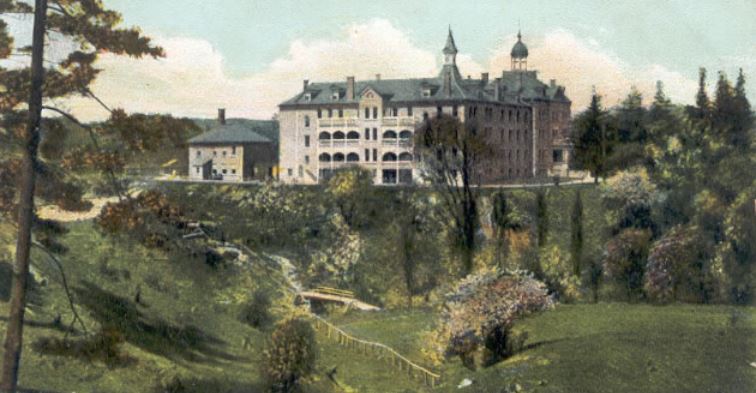
With only $8,000 in his pocket, Father McNulty started a tradition that would last for 92 years. That year, the inaugural House of Providence Picnic raised the additional $2,000 he needed and on August 22, 1879, Father McNulty purchased the home for a cool $10,000 and gifted the House of Providence to the Sisters of St. Joseph’s of Hamilton. The House of Providence Picnic became the highlight of the Dundas Social season and attracted a crowd of thousands every year.
The Sisters not only ran House of Providence for the elderly but also took in orphan children and nursed those who suffered from a variety of illnesses. It quickly became a resource for the entire community.
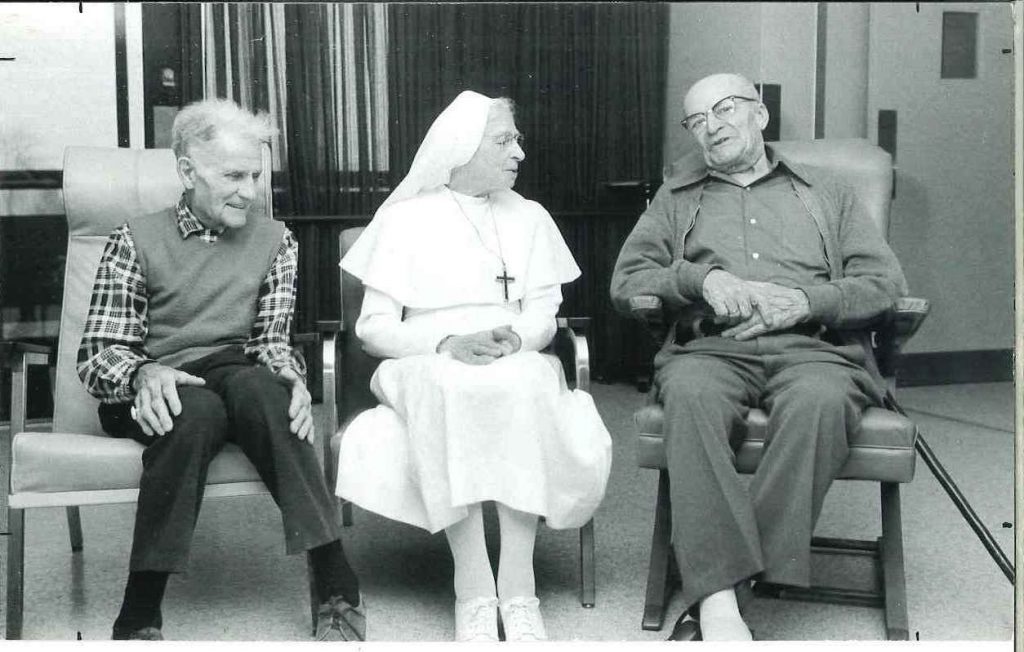
The Sisters were devoted to serving all those in need, people of all faiths. Their compassion and care were met with great generosity from citizens and civic leaders from Dundas and the surrounding areas. When the original building was practically destroyed in a fire in 1900, the community rallied together and reconstructed the House of Providence in just one year.
1970 marked a new age for the House of Providence, with the construction of a new and modern building renamed St. Joseph’s Villa. The former House of Providence was demolished only a year later after a second fire left it beyond repair. St. Joseph’s Villa transformed with the construction of two new additions of the Margaret and Charles Juravinski and Neil and Anne McArthur Family wings. Orchid Garden, a 12 bed unit was opened in January 2015, expanding the Villa to our current home with 390 long-term care beds. The St. John Vianney Residence was built in 2016 to provide a home for eight retired priests.
The Villa is excited to expand our campus of care in the community, building a 6 bed hospice, with 4 additional rooms for specialized care, set to open in the fall of 2020.
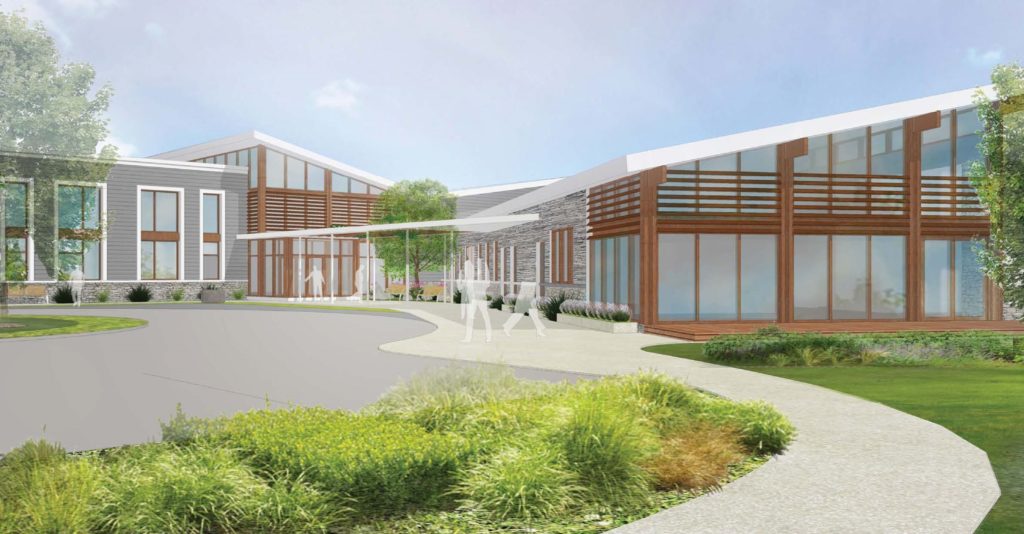
Today, St. Joseph’s Villa is not just a long term care facility. Over 300 people from the community attend 26 classes each week, & an additional 100 children attend swimming lessons here!
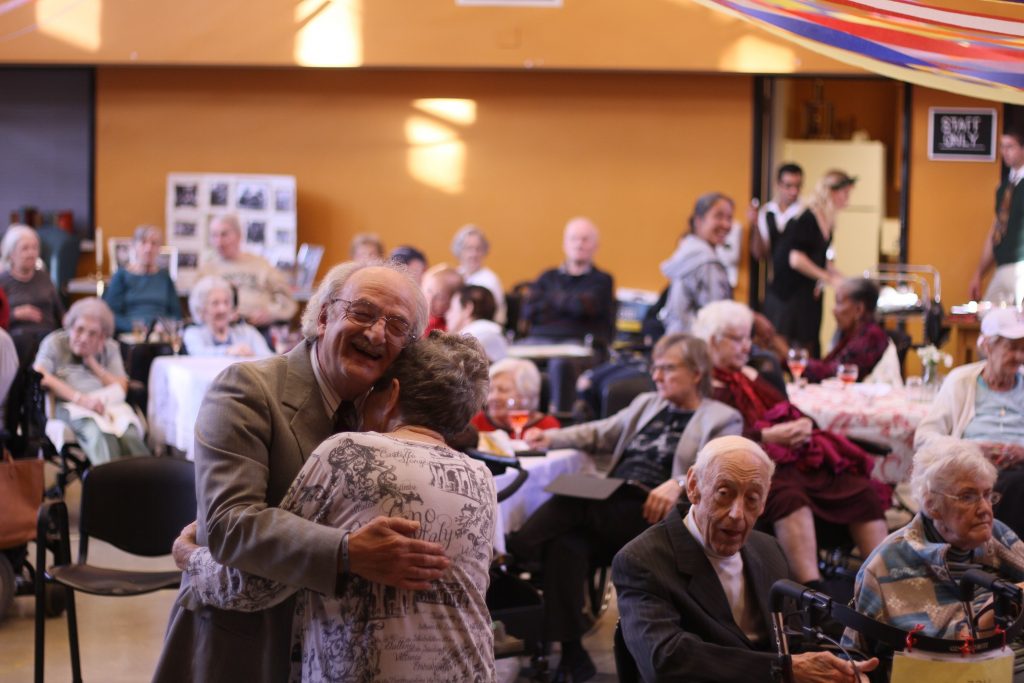
Check out our video that captured the 140th-anniversary celebration at St. Joseph’s Villa Dundas.

